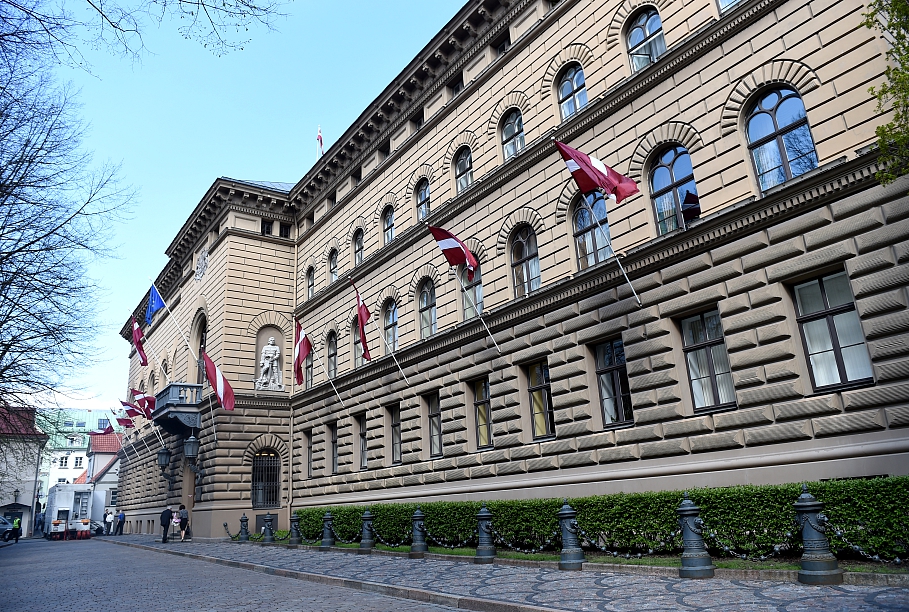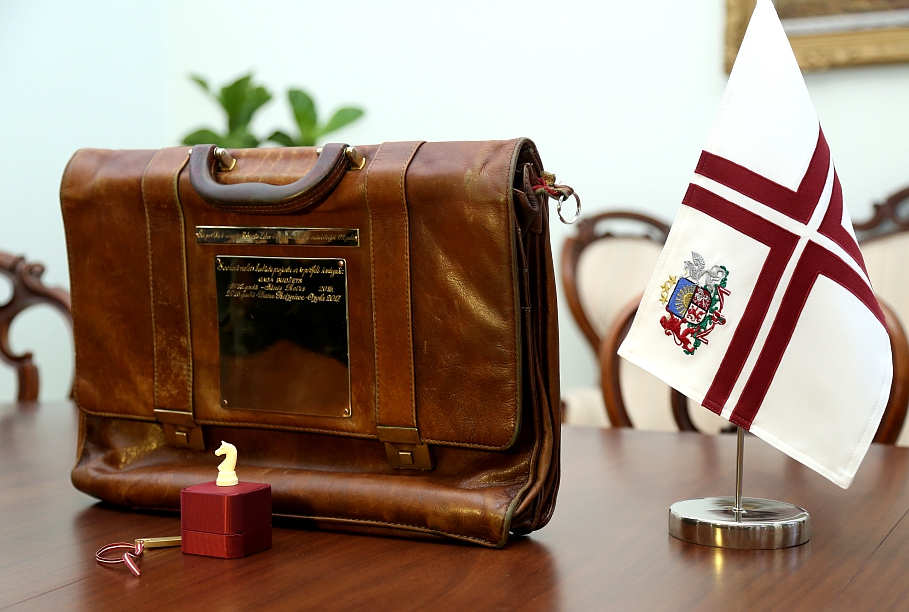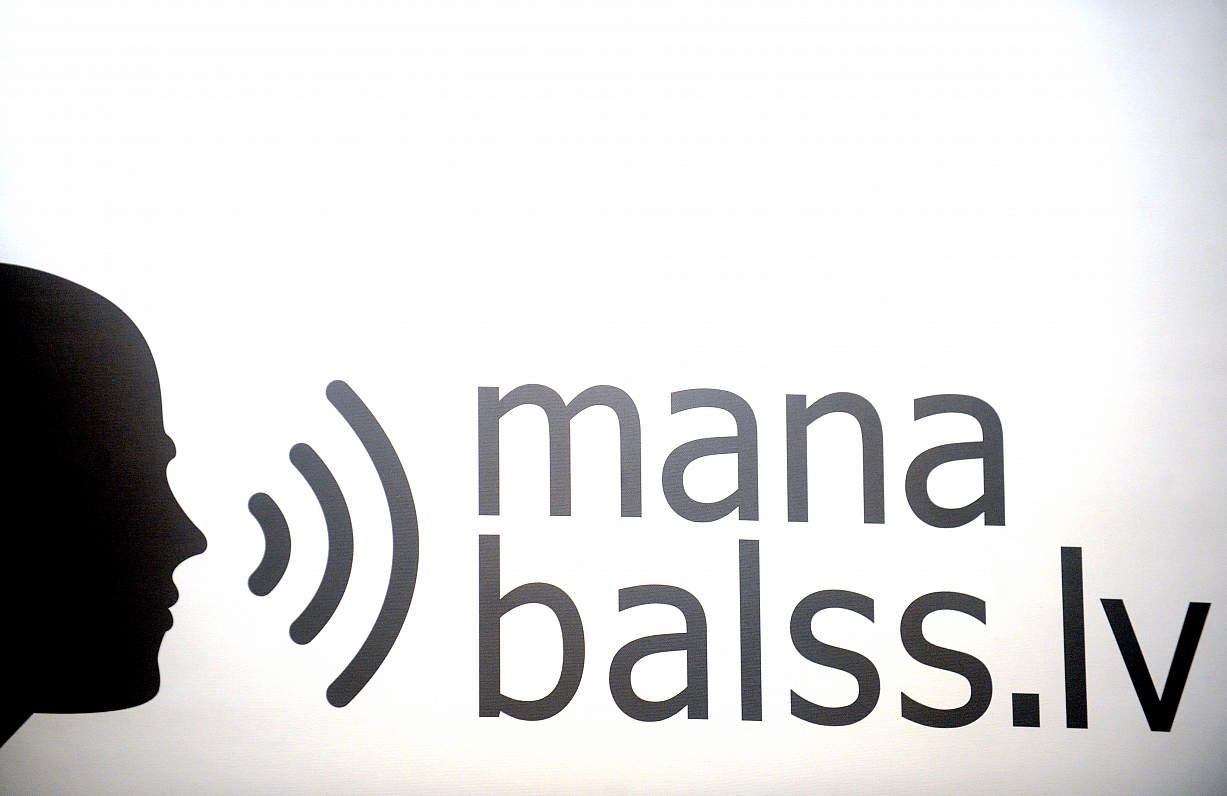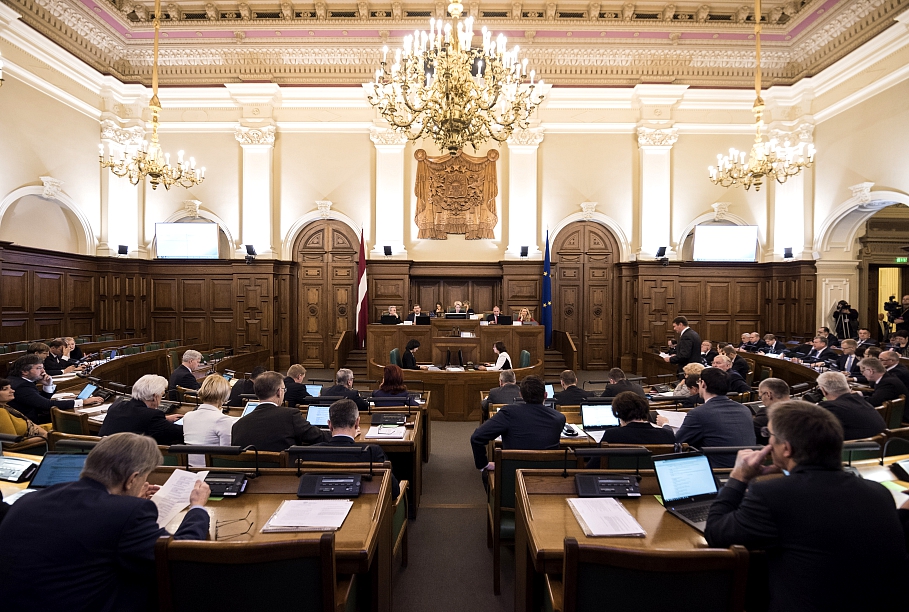The Saeima's work is governed by the Satversme (Constitution), and the Saeima's rules of order. The Saeima building is located on Jēkaba st. 11 in Old Riga. Three other buildings for factions (parties or groupings within the parliament) and committees are located nearby. The parliament employs about 400 people.
- How the Saeima is elected
- What the Saeima does
- Organizing the Saeima - the Saeima Praesidium
- Saeima sessions - livestreamed and archived
- Committees review bills before each reading
- Foreign Policy debate - a successful example of minister-MP engagement
- Grassroots initiatives get a say at the Saeima

How the Saeima is elected
Latvia uses proportional representation as its electoral system. Elections are held every four years, and parliamentary seats fall to parties that get at least 5% of the popular vote (there was no 5% barrier during the inter-war period, leading to fragmentation). The voting age is 18. Candidates must be at least 21 years old and have no criminal record. Each candidate in theory represents around 15,000 voting-age Latvians.
Proportional representation works well in countries with many competing political parties and pronounced ethnic differences. Under this system, diverse groups of people are represented in the parliament, discouraging "street democracy" and violent protests, argues politician and former MP Valdis Liepiņš in a piece for Latvia's official state bulletin.
While the drawbacks of proportional representation, Liepiņš argues, are that it often leads to strenuously formed coalition governments that cooperate poorly. Government seats are fought for depending on the parties' areas of interest rather than competence.
Another drawback the former MP mentions is a weak link between MPs and the electorate, because people can only vote for parties instead of candidates.
He also points out that parties often make their top candidates run in all election regions, with the consequence of them being elected from Vidzeme and Riga with larger populations while their spots on other regions' election lists are taken by less popular MPs or even those 'crossed out' (moved down the electoral list by voting choice) in the election ballots.
What the Saeima does
Lawmaking - The chief function of the Latvian parliament. The president, the Cabinet of Ministers, as well as Saeima Committees and at least five MPs can submit a bill. Voters can send a bill directly to the Saeima with the support of at least 1/10th of the voting population.
Bills become law through three revisions readings -- or two, if MPs opt for a "fast-track" procedure, with the caveat that amendments to the Constitution cannot be fast-tracked -- and become official once promulgated (signed into law) by the president and published in the state bulletin. International treaties pass through the parliament as well.
The pace at which bills become laws depends on their content, priority, the quality of the bill, as well as the number and nature of the proposals during the drafting process, and other things, Dina Meistere, head of the Saeima Legal Department told LSM.
According to her, in extreme cases the Saeima can adopt laws within a few days or even a few hours, however the submitter must present arguments justifying the rush.
The pace of lawmaking also depends on whether the proposal is a new law or seeks to amend an existing one. Meistere singled out the Administrative Proceedings law, which required three readings, as being adopted three years after its submission.
Meistere told LSM that, out of 822 bills sent to the current Saeima, 565 were submitted by the Cabinet of Ministers, 119 by the Saeima committees. The president submitted a further three while MPs sent in a total 135 bills.
Electing officials - the Saeima elects a number of high-ranking officials, including the President of Latvia, prosecutor general, Bank of Latvia president, the board of the media watchdog, head of the anti-corruption force, and others.
Adopting the budget - after receiving the budget portfolio from the government, the Saeima gets the final say on the budget.
Keeping the government in check - the Saeima can issue a vote of no confidence against any minister or the entire government. The parliament also holds Q&A sessions with government members and officials, such as the Prime Minister and Bank of Latvia President.

Organizing the Saeima - the Saeima Praesidium
The agenda of the Saeima is regulated by the Saeima Praesidium. It consists of the Saeima Speaker -- an official who represents the Saeima and also acts as the interim president should he or she be abroad or sick -- and two assistants, as well as the Saeima Secretary and the secretary's assistant.
The Saeima Speaker meets both Latvia's ambassadors and foreign ambassadors to Latvia once a year.
The Praesidium provides reports to the Saeima, arranges the Saeima sessions and performs a number of other duties of an organizational nature.
Saeima sessions - livestreamed and archived
The Saeima sessions are held each Thursday and are livestreamed, with an archive available starting November 2014. Shorthand transcripts, as well as a live agenda are available on Saeima's website.
MPs face a fine of 20% of their monthly salary for each non-attended weekly session. MPs can only miss the sessions if they have a valid excuse, such as being ill or being on a visit related to their duties at the Saeima. The Praesidium records attendance and doles out fines should MPs be absent.
MPs can be sacked from their committees and replaced if they miss three meetings in a row.
Committees review bills before each reading
The Saeima has sixteen committees working in areas of legislature or fulfilling other tasks, such as evaluating public expenses, reviewing ethics violations, or taking care of EU affairs.
The parliament sets up the committees after being elected, with MPs assigned to committees proportionally to their factions' seats in the Saeima. However two members from each faction are elected to the Mandate, Ethics and Submissions Committee and one each to the National Security Committee.
Meeting about once a week and often holding joint meetings, committees prepare discussion proposals for the Saeima sessions. They review bills as well as suggestions and submissions. When working with bills, committees hear out the arguments of the ministries, industry experts, social partners and NGOs.
Committees also supervise the executive bodies, keeping an eye on current events and suggesting improvements in the way ministries and public institutions are run.
MPs can only work, at most, in two committees at a time and can chair only one. Committees responsible for specific bills review them before each reading.
MPs can set up additional investigative committees if at least a third of them ask for it. Past examples include committees investigating the Zolitūde disaster and the sale of the state-owned Citadele bank.
MP Ojārs Ēriks Kalniņš, who's been heading the Foreign Affairs Committee since 2010, told LSM about the scope and duties of his committee.
The Committee "reviews and passes all international laws and treaties, be they bilateral or multinational. We also meet regularly with the Foreign Minister and Latvian ambassadors to review foreign policy issues and oversee the activities of the Foreign Ministry. We can also author statements on foreign policy issues and submit them to the Saeima for a full vote.
"However the Committee also meets foreign parliamentary and government delegations in Riga and abroad.
"In a sense, we handle foreign affairs and diplomacy for the Saeima," he said.
"The parliament, if it chooses to do so, can play a big role in supporting and implementing Latvia's foreign policy. This is especially important since other parliaments also play instrumental roles in their governments' foreign policy," said MP Ojārs Ēriks Kalniņš.
"As long as the Committee supports the government's foreign policy initiatives and works closely with the Foreign Ministry, we can supplement what the Ministry and its ambassadors do. Foreign Ministers meet with other FMs, but we can meet with a broader spectrum of foreign politicians," said the MP.
"Parliamentary diplomacy can play a big role if we make use of the opportunities, which is something I have encouraged," he said. "Many of my meetings are one-on-one. I probably spend 90% of my time in Saeima working on foreign policy in one capacity or another," said Kalniņš.
MPs and Foreign Minister engage successfully in annual Foreign Policy debate
An important event in the Saeima yearly calendar is the annual Foreign Policy debate, held each year since 2010. The debate reviews the previous year and identifies key priorities for the coming year in terms of foreign policy, after hearing a report by the Foreign Minister.
Ojārs Ēriks Kalniņš singled out the debate as a successful tradition bringing together MPs and the government.
"MP participation [in the debate] has increased each year. To promote participation, our committee initiated our own pre-debate sessions, where we meet with Latvia's foreign policy experts, NGO's, and Foreign Ministry representatives. As a result, our MPs are better prepared when the big debates come," he said.
"In recent years we have actually made suggestions to the FM's final report before it goes to the government. So that the end result is a joint FM and Committee product," said Kalniņš.
"To me, [the debate] is the closest our parliament ever gets to the British parliamentary system, when ministers actively engage with the MPs," the MP said.
Grassroots initiatives get a say at the Saeima
The Saeima rules of order allow a public initiative (e.g. law proposal) having at least 10,000 signatures to be sent to the Mandate, Ethics and Submissions Committee, which has the final say on whether an initiative is worth pursuing.
The initiatives mostly come through the Manabalss.lv grassroots public petition portal. Within the last six years the portal, which is meant to promote discussion between the populace and MPs, has helped citizens "achieve 14 positive changes", according to Imants Breidaks, head of Manabalss.lv.
The initiatives submitted for review on the portal range from stopping the sale of the formerly state-owned Citadele bank to banning the farming of furs to legalizing marijuana.

"Manabalss.lv often serves as a tool for bringing forth painful, sensitive, and uncomfortable matters that MPs have mostly tried ignoring rather than solving," said Breidaks.
Breidaks claimed that Latvians mostly criticize the Saeima for a perceived inactivity, explaining it with communication problems at the Saeima.
"While some MPs are very active on social media, others don't show up anywhere in public. Even though the Saeima website publishes pieces about different activities every day, no one reads them," he said, adding that it often leads to media covering only the topics of current interest.
Keeping in mind that the Saeima has made reviewing public petitions a part of the Saeima's duties, Breidaks praised the Saeima as one of the friendliest parliaments in Europe and the world.
"We can say 'thank you' to the Saeima for the opportunity. In Poland, for example, something like this is unimaginable and won't be at least for ten more years," said Breidaks.
In addition it should be noted that the live online coverage of Saeima sessions (and even some committee meetings) is very impressive and far in advance of many other parliaments. Added to the fact that cabinet meetings are also routinely livestreamed it means that any Latvian voter with some time and an internet connection can keep a close watch on what their representatives do and say in the performance of their duties.
































